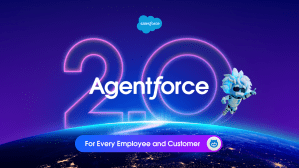The first AI, created in 1950, essentially functioned like a recipe follower — strictly adhering to a set of instructions without any tasting or adjusting along the way. Today, AI is or more like a skilled chef, one who can taste, adapt, and even invent recipes — dynamically learning and generating creative outputs.
But what if AI could go one step forward, not just generating a recipe, but taking action to bring the meal to life — buying ingredients, scheduling reservations, and adjusting for challenges along the way?
This is the promise of agentic AI. AI agents are autonomous, proactive applications designed to execute specialized tasks. Agents use large language models (LLMs) to analyze and understand the full context of a request, prompt, or an automated trigger, then reason through decisions on the next steps autonomously.
And while a majority of workers don’t fully trust AI to operate autonomously today, 77% of workers say they will eventually trust AI to operate autonomously. This reveals a real opportunity for enterprises to augment their employees, expand their workforce, and improve customer experiences in 2025.
As Salesforce leaders look toward the era of agentic AI, they see a variety of ways it may come to life — and strategies to ensure it will be successful. Read on for predictions from Salesforce leaders on:
- How humans will interact with agents in the future
- What it will take for humans to trust autonomous AI
- How AI agents will change the way we work
- How AI agents will transform industries
What is Salesforce (and why are its executives predicting the future)?
Salesforce is the world’s #1 AI CRM, helping organizations of any size reimagine their business for the world of AI with autonomous and trusted agents, unified data from any source, and Customer 360 apps.
With Salesforce, humans and agents drive customer success together.
Salesforce leaders are on the front lines of the latest trends, technologies, and challenges impacting businesses. They bring expertise and insight from market analysis, customer conversations, and more to help reveal what tomorrow might bring.
How Humans Will Interact with Agents
The concept of agentic AI — AI systems that operate with a degree of autonomy, goal-orientation, and decision-making capability — brings up a fascinating array of future possibilities. Salesforce leaders foresee a variety of potential futures for the revolutionary technology.
1. Copilots will be commoditized.
“Using AI as a reactive personal assistant for general-purpose productivity — drafting emails, making recipes, summarizing documents, planning itineraries — will become table stakes, as common as spell-check. This technology will soon be built into personal devices and seamlessly integrated across AI tools and platforms used in business. The transformative leap will come from AI that moves past generic assistance and evolves into business-aware intelligence — understanding the unique context, challenges, and needs of your industry to carry out meaningful, strategic business tasks and decisions on your behalf.” – Adam Evans, EVP & GM, Salesforce AI Platform
2. We’ll move from single agents to multi-agent teams for complex use cases.
“In 2024, AI agents began augmenting people in simpler use cases, such as sales and service. In 2025, we’ll increasingly see more complex, multi-agent orchestrations solving higher-order challenges across the enterprise, like simulating new product launches or marketing campaigns and developing recommendations for adjustments. Salesforce’s own Atlas Reasoning Engine employs multiple large language models (LLMs), large action models (LAMs), and specialized RAG modules to perform distinct subtasks like (re)ranking, refining, and synthesizing, leading to state-of-the-art levels of trustable autonomy.” – Mick Costigan, VP, Salesforce Futures
3. AI skepticism will give way to AI confidence.
“Despite continued executive urgency to incorporate AI tools into business operations, more than two thirds of desk workers still say they’ve never used AI at work. In 2025, we’ll see the barrier-to-reliance on AI wane as users work side by side with agents for common tasks like automating projects, new hire onboarding, generating content, or managing IT incidents. Agents’ advanced reasoning and ability to make decisions and take action will transform how every user works and how they engage with customers. In turn, desk workers will grow more confident with AI and businesses will see even greater adoption and ROI on their investments.” – Rob Seaman, Chief Product Officer, Slack
4. AI agents will become the preferred channel for customers to engage with businesses.
“As AI agents become increasingly powerful and capable of delivering highly personalized experiences, consumer engagement with the technology is expected to surge, creating a valuable new marketing channel for businesses. To fully harness the potential of AI agents, organizations will need to form cross-functional “Agent Experience” teams that connect marketing, sales, service, and commerce departments. These teams will be essential in optimizing AI-driven interactions, enabling businesses to provide deeper, more dynamic consumer experiences while driving growth and improving operational efficiency throughout the customer journey.” – Jon Belkowitz, Senior Director, AI Product Management, Marketing Cloud
5. A rise in personal agents and bring-your-own AI.
“New advances will place ever-more-powerful AI agents in the hands of consumers. Agentic capabilities in consumer devices and apps, like Apple Intelligence and China’s super-apps that offer a one-stop shop for users, are already emerging and aim to leverage personal context to help users get things done effortlessly. As people begin to bring their personal AI agents to the workplace, companies will need to find ways to integrate AI into the enterprise more quickly. We call this trend BYOAI (bring your own AI agent), mirroring the earlier BYOD (bring your own device) movement that saw workers bringing personal smart phones to the office. And as they become mainstream, personal AI agents will forever change how companies connect to their customers. Successful companies will offer trusted, hyper-personalized messaging, services, and products at the moments when they matter most, and they’ll package everything in easy-to-consume ways for the agents that increasingly serve as customer proxies.” – Mick Costigan, VP, Salesforce Futures
6. Actionable analytics will be powered by Agentforce Inspectors.
“In this agent era, we are evolving to a place where – thanks to Agentforce – we can have ‘inspector agents’ that are always on and look for anomalies across any business or department. These analytics agents will be able to identify issues and opportunities across any business and then trigger instant actions. We think this will lead to improved outcomes and give analysts and business users more time for important decisions and actions that need human judgment. For example, when a sales team uses a tool like Tableau, powered by Agentforce, agents will help identify when a team’s pipeline drops below a certain threshold and then instantly trigger a sales play in Slack. This is just one example of how humans and agents can deliver success at scale.” – Ryan Aytay, CEO, Tableau
7. AI agents will collaborate and work together.
“In the coming year, we will begin to see AI agents working together in swarms, collaborating to tackle everyday tasks and business challenges, much like ants building intricate colonies. This evolution will redefine productivity and problem-solving on an unprecedented scale. AI agents will become seamlessly integrated into our lives, with individuals having personal agents and organizations deploying specialized ones. Available through platforms such as Agentforce, these agents will be tailored to specific tasks and work together to achieve shared objectives. The future will not just be about using AI; it will be about creating and customizing agents that collaborate to understand and execute strategic tasks and decisions, both in personal and business contexts.” — Silvio Savarese, Chief Scientist & Head of Salesforce AI Research
8. Agents will solve for a fragmented customer experience.
“Today, different teams split ownership of multiple pieces of a long customer journey, from marketing creating a lead to business development reps collecting and landing a lead, to account reps nurturing a customer relationship and providing post-sales services, and more. And without conversation context being shared across departments, the customer’s experience is fractured and frustrating. Agents will change that in 2025. Agents will have access to the data that gets missed in human to human hand-offs, including prior conversation and context. Tomorrow’s agents will be able to orchestrate seamless handoffs and transitions across different functional agents and humans to personalize a customer journey undreamt of today.” – Gabrielle Tao, SVP, Product Management
9. Learners will prefer communicating with flexible, 24/7 AI agents.
“Many learners who endured the isolation of the COVID pandemic and found freedom in their first iPhone, rather than their first car, will be more comfortable getting their questions answered by an agent. These students will be able to engage freely with agents, without social anxiety, and be able to get their questions answered immediately, at any hour of the day. This ability to provide flexible, 24/7 support will also make agents the preferred support method for working students or students with children who need flexibility throughout the school year. But, as AI use becomes ubiquitous, institutions will need to be intentional in how they simultaneously help their learners overcome social anxieties and develop the social skills they will need to thrive outside of school.” – Margo Martinez, VP & GM of Education
What It Will Take for Humans to Trust Autonomous AI
To realize this agentic future, trust is paramount. Today, 54% of global workers trust humans and AI to do most work tasks together. When asked if these workers trusted AI to do any of these same tasks autonomously, the answer, for a small group, was some. Salesforce leaders share how to maintain trust in the autonomous AI era, and how agents can support security-related tasks.
1. Businesses will build trust in the agentic AI era.
“We’re at an inflection point with trust in AI with agentic AI — notably, 60% of consumers say advances in AI make it more important for companies to be trustworthy. Maintaining trust in AI systems will become a top priority for businesses, and we’ll see companies create an equal playing field where everyone can access this technology to ensure humans and AI can work together successfully. To this end, companies will implement elements including: building people’s trust and confidence over time with explainability features and user guidance; enabling learning to help users understand the technology and ensure there are feedback mechanisms so users can improve system outputs; and shifting toward human-centered AI designs with people prioritized at the center.” – Paula Goldman, Chief Ethical and Humane Use Officer
2. AI agents will serve as front-line guardians of enterprise security.
“AI agents will become the primary guardians of organizational security, outpacing human capabilities in detecting security vulnerabilities, enhancing security posture, and making proactive changes. Meanwhile, as bad actors leverage agents to create more sophisticated attacks, security agents will be needed to support adaptive real-time threat detection and response. This shift will enable security specialists to focus on higher level architecture.” – Alice Steinglass, EVP and GM, Salesforce Platform
3. AI governance will be a CEO-level priority.
“APIs allow AI agents to perform tasks, access data, and execute processes efficiently. As a result, managing AI agents becomes just as critical as managing APIs, since both are integral to maintaining smooth operations and achieving business objectives. As a result, by 2026, AI governance will be a CEO-level priority as agent topics and actions will need to be audited, managed, and secured. Once companies have a good handle on API and AI governance, they’ll be able to use AI agents widely and successfully.” – Ahyoung An, Chief Business Officer, MuleSoft
4. Companies need to maintain cyber hygiene in the era of agentic AI.
“Adhering to traditional security measures and ensuring human diligence will become more critical than ever in the era of agentic AI. Just as locking your doors is the best way to prevent car break-ins, using proven defenses against non-AI threats is the most effective way to counter AI-based attacks. Effective strategies will include: ensuring companies build a culture of trust and security, implementing hardware root of trust (RoT) for user authentication, requiring multi-factor authentication (MFA), relying on trusted corporate channels (like Slack) when phishers attempt AI-driven scams via SMS or other messaging platforms, and ensuring software is constantly patched and up to date.” – Brad Arkin, Chief Trust Officer
5. The need for trusted AI will lead to more public-private policy collaboration.
“The rapid evolution of AI, especially agentic AI, will drive more proactive engagement from tech companies in policy discussions. In order to strike an optimal balance between fostering innovation and ensuring public safety, it will be crucial for the private sector to bring their technical expertise to the table. This collaboration will be integral to guiding the development of AI policy frameworks that are not a one-size-fits-all, but rather account for the many different ways and contexts in which the technology can be used.” – Eric Loeb, EVP, Global Government Affairs
6. Organizations need to be agent-first to build loyalty.
“In the future, every organization, across varied industries, verticals and sectors, will be agent-first. This means any customer’s interaction with a brand, or constituent’s outreach to his or her government, will often happen first through an AI agent, such as Agentforce — and it means that companies and organizations will choose to evolve further and faster to meet the lasting moment. To stay ahead, brands should focus on creating AI agents that align with core priorities and values and embed customer-centric ethics into every interaction — and ensure that customers know when they are interacting with AI. Those that move now to build trustworthy and transparent digital experiences with the right agents are likely to set the standard, turning these first encounters with AI into lasting brand loyalty.” – Sabastian Niles, President and Chief Legal Officer
How AI Agents Will Change Work
An estimated 41% of employee time is spent on repetitive, low-impact work. Salesforce leaders see a world where agents take on these repetitive tasks, letting humans focus on the more strategic, relationship-building work that drives revenue.
1. Advancements in AI will drive simplicity and activation.
“AI will become easier to implement within day-to-day business applications, allowing companies — especially those with a central view of customer and business data — to natively integrate agents and use data securely to support specific processes. AI will also become more actionable, enabling foundational data to trigger real-time events and actions at scale, enhancing productivity and achieving outcomes previously unattainable. This combination of ease and actionability will lead to higher confidence, utilization, and value from AI in business.” – Steve Hammond, EVP & GM, Marketing Cloud
2. Analytics will be ambient.
“By 2025, 25% of all analytical insights will be delivered ‘ambiently’ thanks to AI — integrated seamlessly into the flow of work and life, without the user consciously deciding, ‘It’s time to do some analysis.’ These insights will surface in real time, embedded in everyday interactions, whether that’s through a recommendation popping up in a meeting tool, a gentle nudge from an AI agent while writing an email, or a notification on a smart device. As data becomes more ubiquitous, the role of the analyst will shift toward shaping these ambient experiences, curating and refining the insights that AI surfaces automatically, ensuring they are contextually relevant and immediately actionable.” – Nate Nichols, VP of Product Management, Tableau
3. AI agents are the new apps.
“Much like how mobile apps revolutionized interactivity, communication, and productivity, AI agents are now poised to redefine access to technology and address everyday business challenges. These agents will be customizable, highly adaptable, and capable of autonomous decision-making, allowing them to anticipate needs, optimize tasks, and offer personalized assistance and solutions. They will operate conversationally in user initiated sessions and as agents in embedded workflows, boosting productivity while scaling business practices across all industries, enabling organizations to operate more efficiently and intelligently than ever before.” – Jayesh Govindarajan, EVP, Salesforce AI
4. The jobs of an autonomous AI future will require a new set of skills.
“The jobs of the future — especially with AI and agents — will require three types of skills: technical, human, and soft. Technical skills include the specific knowledge required to perform tasks, such as data analysis, programming languages, graphic design, or accounting principles. Soft skills are the interpersonal skills that help us interact effectively with others, such as communication, time management, problem solving, and conflict resolution. Human skills are ingrained in our personalities and character, and are things like empathy, resilience, creativity, and emotional intelligence. The companies that will win with AI will help their employees cultivate these skills.” – Lori Castillo Martinez, EVP, Talent Growth & Development
5. The ability to navigate, analyze, and action unstructured data will define your business in 2025.
“Just like its name implies, unstructured data is often the hardest to make sense of and yet it’s also some of the most valuable information within a company. Eighty percent of enterprise data is unstructured data, according to Gartner. 2025 will distinguish the haves from the have nots: the businesses that have the tools and tech to process unstructured data and make it AI-ready will come out on top in this new agentic era. These companies will be better positioned to not only generate stronger business insights — but their teams and agents will be better equipped to make decisions and take action — from analyzing customer sentiments to generating blog posts and creating competitive plans.” – Sarah Walker, COO, Slack
6. Employers will need to prioritize upskilling employees.
“We’ll see a brand new swath of jobs created in response to the acceleration of AI innovation — and existing jobs will be transformed by agents. In response to this, 2025 will be the year of upskilling. Every employer will have to figure out how to put AI and agents into the hands of employees to ensure they’re not left behind. And employees are going to choose the companies that will help them gain critical skills to set them up for success now and in the future.” – Nathalie Scardino, Chief People Officer
7. AI will redefine the employee experience.
“AI agents will transform the experience employees have when they come together in the office. AI and agents will help employers understand how workers use office spaces, book meeting rooms, and gather with their teams, and make recommendations for teams to ensure they always have the right space at the right time. Finally, AI will use workforce planning data to streamline how companies design their real estate portfolios and identify the types of spaces they need around the world.” – Relina Bulchandani, EVP, Real Estate and Workplace Services
How AI Agents Will Transform Industries
The types of tasks, challenges, and goals that AI can help address vary significantly by industry. Salesforce leaders share how agentic AI will benefit different industries in unexpected ways.
1. SMBs will surpass large competitors by leveraging AI agents.
“Small and midsize-sized businesses (SMBs) and growing companies will not only keep up with larger competitors but even surpass them by leveraging AI agents for scalable growth. With AI agents, these businesses will be equipped to streamline operations, boost customer engagement, and deliver personalized marketing. From managing supply chains and following up on sales leads to handling customer support, autonomous agents will empower SMBs to scale swiftly while preserving a strong competitive edge.” – Kris Billmaier, EVP & GM, Sales Cloud and Self-Service & Growth Products
2. 2025 will be the last year of producing cumbersome nonprofit annual reports.
“As the ability to summarize large sums of information accelerates, individual donors will engage more autonomously with the causes they care about. Nonprofits will be able to provide proof points of their work, show tangible results, and present real-time insights to potential donors at the first point of engagement. Cumbersome annual reports will become extinct. Instead, every donor will be able to engage an organization directly and immediately understand the impact of their mission, how their donation or volunteer hours will help support that mission, and make a donation — all directly through an AI agent.” – Lori Freeman, VP & GM, Nonprofit
3. AI agents will power retail experiences.
“Agents have the potential to transform the holiday season and beyond by helping retailers provide personalized, timely, and efficient service to shoppers when they need it most. AI-powered product recommendations have already influenced 16% of all sales in October and November thus far; there is a wide open opportunity for digital retailers to use AI for personal shopper agents that help consumers find exactly what they’re looking for and continue to make the path purchase an easy one.” – Michael Affronti, SVP & GM, Commerce Cloud
4. Agents will scale nonprofit impact.
“Nonprofits are early adopters of AI, with 90% using it to drive engagement. AI agents will help drive meaningful change within these organizations by assessing nonprofit staffing requirements and priorities and co-creating impactful volunteer roles. Agents will also help companies with volunteer programs identify transformative skills-building and provide volunteer opportunities at local nonprofits for their employees.” – Molly Ford, VP, Employer Brand and Recruitment Marketing
5. AI agents will achieve mass adoption within education faster than any other technology.
“AI agents will inspire education institutions to develop a deeper understanding of the economics of their daily operations. This will lead to a shift in thinking from headcount costs per department to costs at the activity level — like the cost to answer a student inquiry — helping institutions reduce costs while driving more impact. And, with staff burnout threatening to destabilize colleges, education workers will welcome the support of agents that can take on tasks like scheduling appointments and assisting with enrollment, or even helping to fill seasonal personnel gaps when staff need extra hands like during busy recruiting seasons and back to school.” – Margo Martinez, VP & GM, Education
6. AI agents will make government services and benefits more accessible.
“The efficiency, cost savings, improved productivity, and ability to provide better citizen support will make autonomous AI the fastest adopted technology in history. By the end of 2025, citizens will engage directly with AI agents for government assistance. Federal and local agencies across the United States will have deployed agents that make it fast and easy for their constituents to do everything from renewing their passports to obtaining occupational licenses to registering their vehicles. Agents will also be able to help people easily understand what kinds of benefits are available to them, what they qualify for, and how to apply.” – Nasi Jazayeri, EVP & GM, Public Sector
More information
- Learn more about Agentforce
- Hear more about the future of agents




















